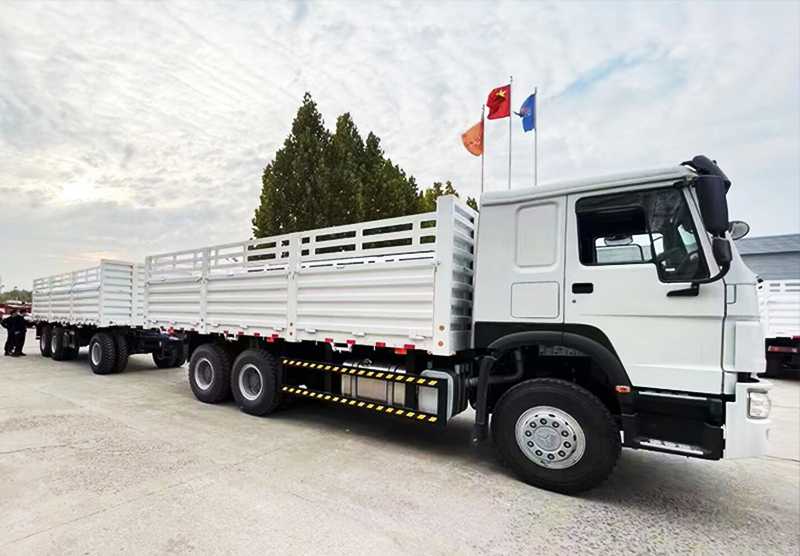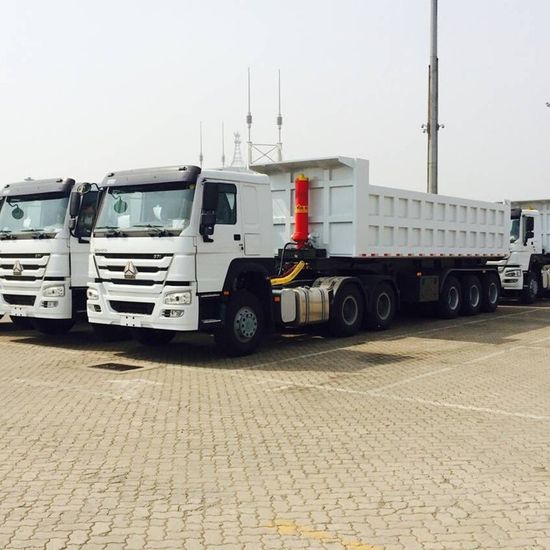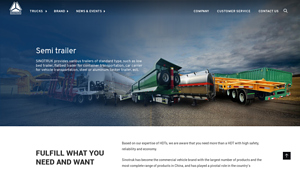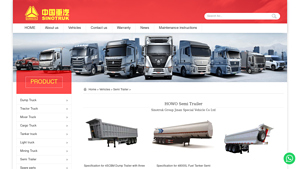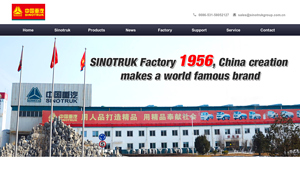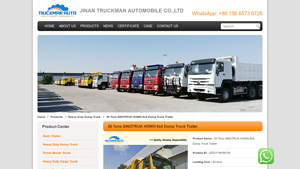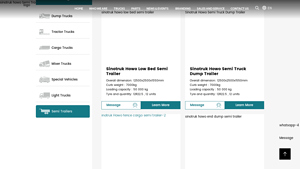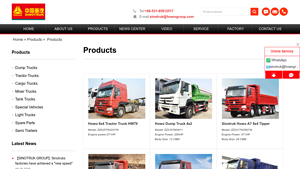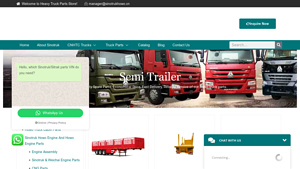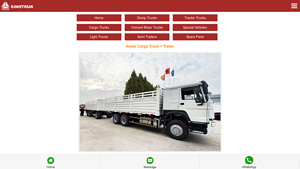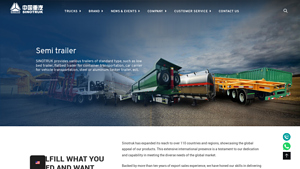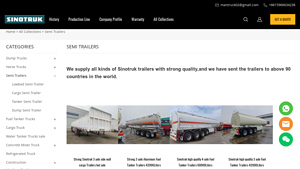Introduction: Navigating the Global Market for sinotruck Howo Truck Trailers
In today’s competitive landscape, sourcing reliable Sinotruck Howo truck trailers poses a significant challenge for international B2B buyers seeking to enhance their logistics capabilities. With a diverse range of trailer options—including low bed, flatbed, and tanker trailers—understanding the nuances of each type can be overwhelming. This guide aims to demystify the complexities of procuring Sinotruck Howo truck trailers by providing detailed insights into various trailer types, their specific applications, and key considerations for supplier vetting.
By addressing critical factors such as pricing structures, performance specifications, and after-sales support, this comprehensive resource empowers buyers from regions like Africa, South America, the Middle East, and Europe—including countries like Nigeria and Saudi Arabia—to make informed purchasing decisions. As you navigate the global market for Sinotruck Howo truck trailers, this guide will serve as your strategic companion, equipping you with the knowledge needed to select the right trailers that align with your operational needs and budgetary constraints. Whether you are looking to transport heavy machinery or manage urban logistics, understanding the full scope of Sinotruck’s offerings will enhance your procurement strategy and drive efficiency in your supply chain.
Understanding sinotruck Howo Truck Trailers Types and Variations
| Type Name | Key Distinguishing Features | Primary B2B Applications | Brief Pros & Cons for Buyers |
|---|---|---|---|
| Low Bed Semi Trailer | Designed for heavy loads, features low height for easy loading | Transporting heavy machinery and equipment | Pros: High load capacity; Cons: Limited to heavy cargo |
| Flatbed Semi Trailer | Open design, suitable for various cargo sizes | General freight, container transport | Pros: Versatile; Cons: Limited protection from elements |
| Fuel Tanker Semi Trailer | Specialized for liquid transport, various material options | Fuel distribution, chemical transport | Pros: Customizable capacity; Cons: Requires careful handling |
| Fence Semi Trailer | Enclosed with fencing, strong load support | Transporting machinery, construction materials | Pros: Secure transport; Cons: Less versatile for different cargo |
| Sidewall Semi Trailer | Drop-side design for easy loading, robust construction | Bulk cargo transport | Pros: Easy access; Cons: Limited to specific cargo types |
What Are the Key Characteristics of the Low Bed Semi Trailer?
The Low Bed Semi Trailer is engineered specifically for transporting oversized and heavy loads, such as construction machinery and large equipment. Its unique low height design minimizes the incline angle for loading and unloading, making it easier to handle tall and heavy items. With a standard load capacity of 80 tons and the ability to accommodate an overload of up to 25%, this trailer is ideal for industries requiring robust transport solutions. B2B buyers should consider the trailer’s tri-axle configuration for better load distribution and flexibility.
How Does the Flatbed Semi Trailer Cater to Diverse Cargo Needs?
Flatbed Semi Trailers are characterized by their open design, allowing for the transportation of various cargo types, including containers and bulk items. They can accommodate two 20-foot containers or one 40-foot container, making them particularly versatile for logistics operations. Buyers should note that while they provide flexibility in cargo size, they offer limited protection from environmental elements, which may necessitate additional tarping for sensitive goods.
What Makes the Fuel Tanker Semi Trailer a Specialized Choice?
Fuel Tanker Semi Trailers are specifically designed for the safe transport of liquids, including fuel and chemicals. Available in materials like aluminum and stainless steel, these trailers can be customized to meet specific capacity requirements, with options typically ranging up to 40,000 liters. B2B buyers must consider the regulatory requirements for transporting hazardous materials, as well as the need for specialized handling and loading equipment to ensure safety during transit.
Why Choose a Fence Semi Trailer for Secure Transport?
The Fence Semi Trailer features a robust design with fencing that provides strong support for various types of cargo, including heavy machinery and construction materials. This design ensures that loads are securely held in place during transport. While it offers excellent security, buyers should be aware that its enclosed structure may limit the types of cargo that can be transported compared to open trailers.
What Are the Advantages of Using a Sidewall Semi Trailer?
Sidewall Semi Trailers are designed with drop sides, allowing for easy loading and unloading of bulk cargo. Their sturdy construction ensures durability and reliability, making them suitable for transporting a wide range of goods. B2B buyers should consider the trailer’s ease of access for loading, which can enhance operational efficiency. However, this design may limit the trailer’s versatility for transporting irregularly shaped or oversized items.
Key Industrial Applications of sinotruck Howo Truck Trailers
| Industry/Sector | Specific Application of sinotruck Howo Truck Trailers | Value/Benefit for the Business | Key Sourcing Considerations for this Application |
|---|---|---|---|
| Construction | Low Bed Trailers for Heavy Machinery Transport | Efficient and safe transportation of oversized equipment, minimizing downtime. | Load capacity, ramp design for easy loading, and durability of materials. |
| Oil & Gas | Fuel Tanker Trailers for Transportation of Fuels | Reliable supply chain for fuel delivery, reducing transportation costs. | Tanker capacity, material type (aluminum vs. steel), and compliance with safety standards. |
| Mining | Dump Trailers for Bulk Material Hauling | Increased productivity with high payload capacity, reducing the number of trips. | Tipping mechanism efficiency, trailer durability, and maintenance support. |
| Logistics & Freight Forwarding | Flatbed Trailers for Container Transport | Versatility in transporting various container sizes, enhancing operational flexibility. | Compatibility with container sizes, weight distribution, and loading/unloading efficiency. |
| Agriculture | Sidewall Trailers for Bulk Agricultural Products | Facilitates the transport of bulk goods, improving supply chain efficiency. | Load capacity, trailer height, and material strength for heavy loads. |
How are sinotruck Howo Truck Trailers Used in the Construction Industry?
In the construction sector, sinotruck Howo Low Bed Trailers are pivotal for transporting heavy machinery such as excavators, bulldozers, and cranes. These trailers solve the challenge of moving oversized equipment, ensuring that construction projects proceed without delays. Buyers in this sector should consider the load capacity and ramp design, which allows for easy loading and unloading, as well as the durability of the trailer to withstand harsh site conditions.
What Role do Fuel Tanker Trailers Play in the Oil & Gas Sector?
Fuel Tanker Trailers from sinotruck Howo are essential in the oil and gas industry for the safe and efficient transportation of fuels. They ensure a steady supply chain, which is crucial for operations that rely on timely fuel delivery. When sourcing, businesses should evaluate the tanker’s capacity, the material used (aluminum or steel), and compliance with international safety regulations to mitigate risks associated with fuel transportation.
How do Dump Trailers Enhance Efficiency in Mining Operations?
Dump Trailers are widely used in the mining industry for hauling bulk materials like ores and aggregates. Their design allows for high payload capacities, which significantly increases productivity by reducing the number of trips required to transport materials. Buyers should focus on the efficiency of the tipping mechanism, the overall durability of the trailer, and the availability of maintenance support to ensure continuous operations in rugged mining environments.
Why are Flatbed Trailers Important for Logistics and Freight Forwarding?
Flatbed Trailers are crucial for logistics and freight forwarding companies that transport containers of various sizes. Their versatility allows for the accommodation of 20, 40, and 45-foot containers, enhancing operational flexibility. When sourcing flatbed trailers, businesses should consider the trailer’s compatibility with different container sizes, weight distribution capabilities, and efficiency in loading and unloading to streamline their logistics operations.
How do Sidewall Trailers Benefit the Agriculture Sector?
In agriculture, Sidewall Trailers are used for transporting bulk agricultural products such as grains and fertilizers. Their design facilitates the easy loading of large quantities, which improves supply chain efficiency. Buyers in this sector should pay attention to the load capacity, trailer height for accommodating various products, and material strength to ensure the trailers can handle heavy agricultural loads without compromising safety.
3 Common User Pain Points for ‘sinotruck Howo Truck Trailers’ & Their Solutions
Scenario 1: Difficulty in Ensuring Compliance with Local Regulations
The Problem: International B2B buyers often face challenges in ensuring that the Sinotruck Howo Truck Trailers they purchase comply with local regulations and standards. This issue is particularly prevalent in regions like Africa and the Middle East, where regulations can vary significantly between countries. Buyers may be unsure about weight limits, design specifications, or safety features required by local authorities, leading to potential fines, delays, or even the inability to operate their vehicles legally.
The Solution: To navigate these regulatory complexities, buyers should engage with local consultants or legal experts who specialize in transportation regulations in their specific countries. Additionally, sourcing trailers that come with customizable features can help ensure compliance. For instance, Sinotruck offers a range of semi-trailers that can be tailored to meet regional specifications, such as load capacity and safety standards. Before finalizing a purchase, buyers should request documentation from the manufacturer that outlines compliance with local laws, and consider conducting a site visit to verify the capabilities of the trailers in real-world applications.
Scenario 2: Challenges with After-Sales Service and Spare Parts Availability
The Problem: After purchasing Sinotruck Howo Truck Trailers, many B2B buyers report difficulties in obtaining timely after-sales service and spare parts. This can lead to extended downtime and increased operational costs, which are critical pain points for logistics companies that rely on these vehicles for revenue generation. Especially in remote regions, the lack of readily available support can severely impact a company’s ability to maintain its fleet.
The Solution: To mitigate this issue, buyers should prioritize sourcing from authorized Sinotruck dealers who can guarantee robust after-sales support and a reliable supply chain for spare parts. Establishing a clear communication channel with the dealer for regular maintenance checks and emergency repairs can also enhance service reliability. Furthermore, buyers are encouraged to inquire about the availability of a local service network or partnerships that can provide immediate assistance when required. Creating a maintenance schedule that aligns with the manufacturer’s recommendations can help ensure that potential issues are addressed before they lead to costly downtimes.
Scenario 3: Concerns About Trailer Performance and Durability
The Problem: Buyers often worry about the performance and durability of Sinotruck Howo Truck Trailers, especially when transporting heavy and oversized loads in challenging terrains. Questions regarding load capacity, structural integrity, and resistance to wear and tear can deter potential buyers, particularly in industries like construction and mining where the stakes are high.
The Solution: To address these concerns, buyers should conduct thorough research on the specific models of Sinotruck trailers, focusing on their engineering specifications and real-world performance reviews. Engaging with existing customers through testimonials or case studies can provide valuable insights into the durability and reliability of the trailers under similar operating conditions. Additionally, buyers can request detailed performance reports from Sinotruck, highlighting the materials used and the testing processes the trailers underwent. Opting for models with proven track records, such as the low bed trailers designed for heavy machinery, can significantly enhance confidence in the durability and operational efficiency of the fleet.
Strategic Material Selection Guide for sinotruck Howo Truck Trailers
What Are the Key Materials Used in Sinotruck Howo Truck Trailers?
When selecting materials for Sinotruck Howo Truck Trailers, several factors come into play, including performance, durability, cost, and compliance with international standards. Here, we analyze four common materials: high-strength steel, aluminum, composite materials, and carbon fiber. Each material has unique properties and implications for international B2B buyers, particularly in regions such as Africa, South America, the Middle East, and Europe.
High-Strength Steel: A Reliable Choice for Structural Integrity
High-strength steel is the most commonly used material in the construction of Sinotruck Howo Truck Trailers. It offers excellent tensile strength and resistance to deformation under heavy loads, making it ideal for trailers designed to carry substantial weights.
Key Properties: High-strength steel typically has a yield strength of 350-700 MPa, making it suitable for heavy-duty applications. It also exhibits good fatigue resistance and can withstand high temperatures.
Pros & Cons: The primary advantage of high-strength steel is its durability and ability to handle extreme conditions. However, it can be heavier than other materials, which may affect fuel efficiency. Additionally, while it is cost-effective, the manufacturing process can be complex due to the need for precise welding and fabrication techniques.
Impact on Application: High-strength steel is particularly effective for trailers transporting heavy machinery or construction materials. Its robustness ensures safety and reliability in various environmental conditions.
Considerations for International Buyers: Buyers must ensure that the steel used complies with relevant standards such as ASTM A572 or DIN 17100. In regions like Nigeria and Saudi Arabia, local sourcing of materials may also influence compliance and cost.
Aluminum: Lightweight and Corrosion-Resistant
Aluminum is increasingly being used in the manufacturing of trailers due to its lightweight nature and excellent corrosion resistance, especially in environments prone to moisture.
Key Properties: Aluminum has a density of about 2.7 g/cm³, significantly lower than steel, and offers good strength-to-weight ratios. It is also resistant to rust and corrosion, which enhances the longevity of the trailers.
Pros & Cons: The primary advantage of aluminum is its lightweight, which can lead to better fuel efficiency and increased payload capacity. However, it is generally more expensive than steel and may not provide the same level of structural integrity under extreme loads.
Impact on Application: Aluminum trailers are ideal for transporting goods over long distances where weight savings are critical, such as in intercity logistics.
Considerations for International Buyers: Buyers should consider compliance with standards such as ASTM B209 for aluminum alloys. In regions like Europe, where weight restrictions are stringent, aluminum trailers can provide a competitive edge.
Composite Materials: Innovative Solutions for Specialized Applications
Composite materials, often a combination of fiberglass and resin, are used in specific applications where weight reduction and corrosion resistance are paramount.
Key Properties: Composites can be engineered to provide high strength while maintaining a low weight. They are also resistant to a variety of chemicals, making them suitable for transporting corrosive materials.
Pros & Cons: The main advantage of composites is their lightweight and resistance to environmental degradation. However, they can be more expensive to produce and may require specialized manufacturing techniques.
Impact on Application: Composites are particularly useful in trailers designed for transporting chemicals or other sensitive materials that require enhanced protection.
Considerations for International Buyers: Compliance with standards such as ASTM D638 for tensile properties is essential. In regions with diverse climates, the ability of composites to withstand extreme temperatures should also be evaluated.
Carbon Fiber: The Future of Lightweight Trailers
Carbon fiber is an emerging material in the trailer industry, known for its exceptional strength-to-weight ratio.
Key Properties: Carbon fiber composites can achieve tensile strengths exceeding 600 MPa while being significantly lighter than both steel and aluminum.
Pros & Cons: The primary advantage of carbon fiber is its unmatched strength and lightness, leading to superior fuel efficiency. However, it is currently one of the most expensive materials on the market, and its manufacturing process is complex.
Impact on Application: Carbon fiber trailers are ideal for high-performance applications where weight savings directly correlate to operational efficiency, such as in racing or specialized logistics.
Considerations for International Buyers: Buyers should ensure that carbon fiber products meet relevant industry standards, such as those set by the International Organization for Standardization (ISO). The high cost may limit its use in price-sensitive markets.
Summary Table of Material Selection
| Material | Typical Use Case for sinotruck Howo Truck Trailers | Key Advantage | Key Disadvantage/Limitation | Relative Cost (Low/Med/High) |
|---|---|---|---|---|
| High-Strength Steel | Heavy machinery and construction materials | Excellent durability and strength | Heavier, complex manufacturing | Medium |
| Aluminum | Long-distance transport of goods | Lightweight, corrosion-resistant | Higher cost, lower structural integrity | High |
| Composite Materials | Transporting chemicals and sensitive materials | Lightweight, chemical resistance | Expensive, specialized manufacturing | High |
| Carbon Fiber | High-performance applications | Unmatched strength-to-weight ratio | Very high cost, complex production | High |
This strategic material selection guide provides insights into the materials used in Sinotruck Howo Truck Trailers, helping international B2B buyers make informed decisions based on their specific needs and regional considerations.
In-depth Look: Manufacturing Processes and Quality Assurance for sinotruck Howo Truck Trailers
What Are the Main Stages in the Manufacturing Process of Sinotruck Howo Truck Trailers?
The manufacturing process for Sinotruck Howo Truck Trailers consists of several critical stages that ensure the production of high-quality, durable trailers tailored to meet international standards. Understanding these stages can help B2B buyers make informed decisions when sourcing from suppliers.
1. Material Preparation: What Materials Are Used and How Are They Processed?
The first stage involves the careful selection and preparation of raw materials. Sinotruck primarily uses high-quality steel and aluminum, known for their strength and durability. The materials undergo rigorous inspections to ensure they meet the required specifications.
Once selected, materials are cut, shaped, and treated to enhance their performance. Techniques such as laser cutting and CNC machining are employed to achieve precise dimensions, which are critical for the structural integrity of the trailers. This attention to detail in material preparation sets the foundation for a robust final product.
2. Forming: How Are Components Shaped and Assembled?
The forming stage includes the bending, welding, and assembly of the trailer components. Advanced technologies like robotic welding are utilized to ensure strong and consistent welds, minimizing the risk of structural failures. The main beams, which are crucial for load-bearing, are crafted using high-strength carbon steel with a specific design to enhance load distribution.
During this stage, components such as axles, landing gears, and suspension systems are integrated into the trailer structure. The precision in forming not only contributes to the durability of the trailers but also optimizes their performance for various transportation needs.
3. Assembly: What Are the Key Steps in Trailer Assembly?
The assembly process involves bringing together all pre-manufactured components into a cohesive unit. This includes fitting the trailer chassis, attaching the axle systems, and installing electrical components.
Quality control checkpoints are established throughout the assembly process, ensuring each component is installed correctly. For instance, the alignment of axles and the attachment of the kingpin are critical for safe and efficient operation. Each trailer is assembled by skilled technicians who follow strict protocols to maintain high standards.
4. Finishing: How Is the Final Product Prepared for Delivery?
The finishing stage encompasses surface treatment, painting, and final inspections. Sinotruck employs advanced surface treatment methods to prevent corrosion and enhance the aesthetic appeal of the trailers. This includes sandblasting and applying high-quality paint that meets international standards.
Final inspections are conducted to ensure that each trailer meets both the functional and aesthetic requirements. This includes testing the electrical systems, checking the integrity of welds, and ensuring all safety features are operational.
What Quality Assurance Measures Are in Place for Sinotruck Howo Truck Trailers?
Quality assurance is paramount in the manufacturing of Sinotruck Howo Truck Trailers, particularly for international markets. Adhering to recognized standards ensures that the products are reliable and safe for use across various applications.
1. Which International Standards Are Followed in Quality Control?
Sinotruck adheres to several international quality management standards, including ISO 9001, which outlines requirements for a quality management system (QMS). Compliance with ISO 9001 ensures systematic processes that lead to improved quality and customer satisfaction.
Additionally, industry-specific certifications such as CE (Conformité Européenne) and API (American Petroleum Institute) are also integral. These certifications demonstrate that Sinotruck’s trailers meet specific safety and performance criteria required in different markets.
2. What Are the Key Quality Control Checkpoints During Production?
Quality control at Sinotruck is integrated at multiple checkpoints throughout the manufacturing process:
-
Incoming Quality Control (IQC): This involves the inspection of raw materials upon arrival to ensure they meet specified standards before production begins.
-
In-Process Quality Control (IPQC): During the assembly and forming stages, continuous monitoring is conducted to catch any deviations from quality standards early in the production cycle.
-
Final Quality Control (FQC): After assembly and finishing, a comprehensive inspection is performed to verify that the trailer meets all specifications and quality standards before it is shipped.
3. How Can B2B Buyers Verify Supplier Quality Control?
B2B buyers can take several steps to verify the quality control processes of Sinotruck or any other supplier:
-
Conduct Audits: Buyers can request to conduct audits of the manufacturing facilities to assess compliance with quality standards and the effectiveness of QC processes.
-
Review Quality Reports: Suppliers should provide documentation of quality control processes, including inspection reports and compliance certifications.
-
Engage Third-Party Inspectors: Utilizing third-party inspection services can provide an unbiased assessment of the manufacturing processes and product quality.
4. What Are the Quality Control Nuances for International Buyers?
International buyers, particularly from Africa, South America, the Middle East, and Europe, must consider specific nuances when evaluating quality control:
-
Regulatory Compliance: Each region has its own regulations and standards. Buyers should ensure that the trailers comply with local laws regarding safety and environmental impact.
-
Cultural Considerations: Understanding the supplier’s commitment to quality can vary by region. Building relationships with suppliers who prioritize quality assurance can lead to better outcomes.
-
Long-term Support: Buyers should inquire about the supplier’s after-sales service and support for spare parts, as ongoing maintenance is crucial for the longevity of the trailers.
In conclusion, understanding the manufacturing processes and quality assurance measures of Sinotruck Howo Truck Trailers is essential for B2B buyers. By leveraging this knowledge, buyers can make informed decisions, ensuring they partner with a reliable manufacturer that meets their operational needs.
Practical Sourcing Guide: A Step-by-Step Checklist for ‘sinotruck Howo Truck Trailers’
This guide serves as a practical checklist for B2B buyers interested in sourcing Sinotruk Howo Truck Trailers. It outlines essential steps to ensure a successful procurement process, focusing on critical aspects such as specifications, supplier evaluation, and after-sales service.
Step 1: Define Your Technical Specifications
Clearly outline your specific requirements for the trailer type, including load capacity, dimensions, and intended use. This step is crucial as it helps narrow down your options and ensures that the trailers you consider meet your operational needs.
- Key considerations:
- Types of trailers (e.g., flatbed, low bed, tanker) suitable for your cargo.
- Maximum weight and size limits based on local regulations.
Step 2: Research the Market and Product Range
Conduct thorough market research to understand the various models offered by Sinotruk and their features. This knowledge will empower you to make informed decisions that align with your logistics strategy.
- Focus on:
- Variants of trailers available, such as low bed or fuel tanker models.
- Comparative analysis of specifications and benefits of different trailer types.
Step 3: Evaluate Potential Suppliers
It is essential to vet suppliers to ensure reliability and quality. Request company profiles, product catalogs, and case studies to assess their expertise and reputation in the market.
- What to look for:
- Certifications and industry standards met by the supplier.
- Customer testimonials or reviews from businesses in similar regions or industries.
Step 4: Verify Supplier Certifications
Ensure that your chosen suppliers hold relevant certifications, which is a testament to their adherence to safety and quality standards. This step minimizes risks associated with procurement.
- Key certifications may include:
- ISO certifications related to manufacturing and quality management.
- Compliance with international transport regulations.
Step 5: Request Quotes and Compare Pricing
Once you’ve narrowed down potential suppliers, request detailed quotations. This step is vital for understanding pricing structures and ensuring that you get the best value for your investment.
- Compare:
- Total costs, including shipping, customs, and potential import duties.
- Payment terms and warranty offers, which can significantly impact your overall budget.
Step 6: Assess After-Sales Support and Parts Availability
Evaluate the after-sales service and the availability of spare parts, which are crucial for maintaining operational efficiency. A good supplier will offer comprehensive support post-purchase.
- Important aspects include:
- Warranty terms and conditions.
- Accessibility of spare parts and service centers in your region.
Step 7: Finalize Contracts and Purchase Agreements
Before making a final decision, ensure that all terms are clearly outlined in a contract. This step protects your investment and sets expectations for both parties.
- Key elements to include:
- Delivery timelines and penalties for delays.
- Clear definitions of product specifications and quality standards.
By following this checklist, B2B buyers can streamline the sourcing process for Sinotruk Howo Truck Trailers, ensuring that they make informed decisions that meet their operational needs.
Comprehensive Cost and Pricing Analysis for sinotruck Howo Truck Trailers Sourcing
What Are the Key Cost Components in Sinotruck Howo Truck Trailers?
When sourcing Sinotruck Howo Truck Trailers, understanding the underlying cost structure is essential. The primary cost components include materials, labor, manufacturing overhead, tooling, quality control (QC), logistics, and the supplier’s margin.
Materials: The choice of materials significantly affects the overall cost. High-quality steel or aluminum for trailer construction can enhance durability but may also increase expenses. Buyers should evaluate the trade-off between material quality and cost to ensure a balance between durability and budget.
Labor: Labor costs can vary based on the region of manufacturing. Countries with lower labor costs may offer competitive pricing, but this can also impact quality. Assessing the skills and training of the workforce involved in production is crucial for ensuring product reliability.
Manufacturing Overhead: This includes indirect costs related to production, such as utilities, rent, and equipment maintenance. Efficient manufacturing processes can help keep these costs down, allowing for better pricing flexibility.
Tooling: Initial tooling costs for custom specifications can be significant. Buyers looking for specific designs should be prepared for upfront investments that will be amortized over the production run, impacting the unit price.
Quality Control: Rigorous QC processes ensure the trailers meet safety and operational standards. While this may add to the cost, it can prevent future expenses related to repairs and compliance issues.
Logistics: Transportation and handling costs to deliver the trailers to the buyer’s location are critical. These costs can fluctuate based on distance, shipping method, and international tariffs, especially for buyers in Africa, South America, the Middle East, and Europe.
Margin: The supplier’s margin will vary depending on market conditions, competition, and the perceived value of the product. Understanding the margin structure can aid in negotiations.
How Do Price Influencers Affect Sinotruck Howo Truck Trailers Pricing?
Several factors influence the pricing of Sinotruck Howo Truck Trailers, impacting the final cost for buyers.
Volume and Minimum Order Quantity (MOQ): Purchasing in bulk typically leads to lower per-unit costs. Buyers should assess their needs against the MOQ offered by suppliers to optimize pricing.
Specifications and Customization: Custom features or specifications may increase costs. Buyers should consider whether they need specialized trailers or if standard models would suffice, as this can significantly affect pricing.
Materials and Quality Certifications: The type of materials used and the presence of quality certifications can influence pricing. High-grade materials and recognized certifications often command higher prices but contribute to better performance and longevity.
Supplier Factors: The supplier’s reputation, experience, and reliability can affect pricing. Established suppliers may offer premium pricing due to their proven track record, while newer entrants might be more competitive.
Incoterms: Understanding Incoterms is crucial for international transactions. They dictate responsibilities for shipping, insurance, and tariffs, which can affect the total landed cost of the trailers.
What Are Some Effective Buyer Tips for Sourcing Sinotruck Howo Truck Trailers?
To maximize value when sourcing Sinotruck Howo Truck Trailers, buyers should consider the following strategies:
Negotiate Wisely: Leverage your purchasing power by negotiating terms, especially if buying in bulk. Establishing long-term relationships with suppliers can also lead to better pricing and service.
Focus on Cost-Efficiency: Evaluate not just the purchase price but the Total Cost of Ownership (TCO). This includes maintenance, fuel efficiency, and potential resale value. A higher upfront cost might be justified by lower operational costs over time.
Understand Pricing Nuances: Be aware of regional pricing differences and market dynamics in Africa, South America, the Middle East, and Europe. Currency fluctuations and local economic conditions can impact overall costs.
Request Comprehensive Quotes: When soliciting quotes, ask for detailed breakdowns of costs. This transparency can help identify areas for negotiation and ensure there are no hidden fees.
Disclaimer on Indicative Prices
Prices for Sinotruck Howo Truck Trailers can vary significantly based on factors such as specifications, market conditions, and supplier negotiations. It is advisable for buyers to conduct thorough research and obtain multiple quotes to gauge the market accurately.
Alternatives Analysis: Comparing sinotruck Howo Truck Trailers With Other Solutions
Understanding Alternatives in Truck Trailers
When considering the procurement of truck trailers, businesses often evaluate multiple options to ensure they select the most suitable solution for their operational needs. This analysis focuses on comparing Sinotruck Howo Truck Trailers with alternative solutions in the market. By examining key aspects such as performance, cost, ease of implementation, maintenance, and best use cases, businesses can make informed decisions that align with their logistics and transportation strategies.
Comparison Table
| Comparison Aspect | Sinotruck Howo Truck Trailers | Alternative 1: Mercedes-Benz Actros Trailers | Alternative 2: MAN TGX Trailers |
|---|---|---|---|
| Performance | High load capacity (up to 80 tons), durable design for heavy goods | Advanced aerodynamics for fuel efficiency, high payload | Strong performance with various configurations for flexibility |
| Cost | Competitive pricing, direct factory sales reduce middleman costs | Higher upfront investment, premium brand pricing | Moderate pricing, good value for performance |
| Ease of Implementation | Customizable options available, easy to integrate into existing fleets | Requires training for optimal use, advanced tech features | Straightforward setup, compatible with various truck models |
| Maintenance | Robust after-sales service, easily accessible spare parts | Comprehensive service network, premium service costs | Reliable service options, moderate maintenance requirements |
| Best Use Case | Ideal for heavy machinery, construction, and oversized loads | Suitable for long-distance transport and logistics | Best for versatile transportation needs across various industries |
Detailed Breakdown of Alternatives
Alternative 1: Mercedes-Benz Actros Trailers
The Mercedes-Benz Actros line is well-known for its advanced technological features and fuel efficiency. The trailers benefit from superior aerodynamics, which can significantly reduce fuel consumption, making them an attractive option for long-haul logistics. However, the initial investment is notably higher, which might be a barrier for some B2B buyers, especially in emerging markets. Additionally, the complexity of the technology may require specialized training for drivers, adding to the implementation timeline and costs.
Alternative 2: MAN TGX Trailers
MAN TGX trailers offer a balance between performance and cost, making them suitable for a range of transport applications. They are designed for flexibility, allowing operators to configure the trailer for various loads. The maintenance costs are moderate, and the service network is reliable. However, while they perform well, they may not have the same heavy-duty capabilities as Sinotruck trailers, making them less ideal for transporting oversized or exceptionally heavy cargo.
Conclusion: Choosing the Right Trailer Solution for Your Business
Selecting the right trailer solution involves careful consideration of specific operational requirements, budget constraints, and the types of loads being transported. Sinotruck Howo Truck Trailers present a compelling choice for businesses focused on heavy-duty transportation, particularly in markets where cost-effectiveness and durability are paramount. However, alternatives like the Mercedes-Benz Actros and MAN TGX offer unique advantages that may suit different operational contexts, particularly for long-distance logistics or diverse cargo needs. Ultimately, B2B buyers should assess their specific use cases and financial considerations to determine the best fit for their fleet, ensuring that their investment aligns with their broader transportation strategy.
Essential Technical Properties and Trade Terminology for sinotruck Howo Truck Trailers
What Are the Key Technical Properties of Sinotruck Howo Truck Trailers?
When considering Sinotruck Howo Truck Trailers, several technical specifications are crucial for B2B buyers to ensure the selection of the right trailer for their operational needs. Here are some essential properties:
-
Material Grade
Sinotruck trailers are typically constructed from high-quality steel, such as carbon steel or aluminum. The choice of material affects durability, weight, and load capacity. For instance, carbon steel provides strength and resilience, making it ideal for heavy-duty applications like transporting machinery or bulk materials. Understanding material grades helps buyers evaluate the trailer’s longevity and performance under various conditions. -
Load Capacity
Load capacity is a critical specification that defines the maximum weight a trailer can safely carry. Sinotruck offers various trailers with capacities ranging from 40 tons to 80 tons, depending on the model. This specification is vital for B2B buyers as it directly impacts operational efficiency and compliance with local transport regulations. Choosing a trailer with an appropriate load capacity ensures cost-effective logistics and avoids penalties from overloading. -
Axle Configuration
The axle configuration, such as tri-axle or quad-axle systems, influences load distribution and stability while on the road. For example, a tri-axle trailer provides better flexibility and load management for heavy cargo, which is essential for maintaining safety during transit. Understanding axle configurations helps buyers choose a trailer suited for their specific transportation needs and terrain. -
Dimensions
The overall dimensions of the trailer, including length, width, and height, are crucial for compatibility with cargo and transport routes. Sinotruck trailers come in various sizes to accommodate different cargo types, such as standard 20ft or 40ft containers. Buyers must ensure that the trailer dimensions align with their logistical requirements to optimize space and efficiency during transport. -
Suspension System
The type of suspension system affects the ride quality and stability of the trailer. Sinotruck typically utilizes common mechanical suspension systems with leaf springs, designed for heavy-duty performance. A robust suspension system is essential for minimizing wear on both the trailer and the cargo, contributing to lower maintenance costs over time. -
Brake System
The brake system’s configuration and quality are critical for ensuring safe stopping capabilities, especially when transporting heavy loads. Sinotruck trailers often feature advanced brake systems that include spring brake chambers and emergency relay valves. Understanding the brake system’s specifications allows buyers to assess the trailer’s safety and compliance with international transport standards.
What Common Trade Terms Should B2B Buyers Know?
Familiarity with industry terminology is essential for effective communication and decision-making in B2B transactions. Here are some common trade terms relevant to Sinotruck Howo Truck Trailers:
-
OEM (Original Equipment Manufacturer)
This term refers to companies that produce parts and equipment that may be marketed by another manufacturer. In the context of trailers, it indicates the original manufacturer of the components used in the trailer, ensuring quality and compatibility. -
MOQ (Minimum Order Quantity)
MOQ defines the minimum number of units a buyer must purchase from a supplier. Understanding MOQ is crucial for buyers, as it influences inventory management and overall procurement costs. Sinotruck may have specific MOQs based on the trailer type, affecting bulk purchasing decisions. -
RFQ (Request for Quotation)
An RFQ is a formal process where a buyer requests pricing and terms from suppliers for specific products or services. Issuing an RFQ for Sinotruck trailers allows buyers to compare offers, negotiate terms, and make informed purchasing decisions. -
Incoterms (International Commercial Terms)
These are a series of international sales terms that define the responsibilities of buyers and sellers in international transactions. Familiarity with Incoterms is critical for B2B buyers to understand shipping costs, risk transfer, and delivery responsibilities when importing Sinotruck trailers. -
Warranty Period
The warranty period specifies the duration during which the manufacturer guarantees the product against defects. Understanding warranty terms is essential for buyers, as it provides assurance regarding the product’s quality and potential support for maintenance issues. -
After-sales Service
This term refers to the support provided by manufacturers after the sale of a product, including maintenance, repairs, and spare parts availability. Knowledge of after-sales service offerings from Sinotruck is vital for buyers, ensuring they have access to necessary support for their trailers throughout their operational life.
By grasping these technical properties and trade terms, B2B buyers can make informed decisions, optimize their logistics operations, and enhance their supply chain efficiency.
Navigating Market Dynamics and Sourcing Trends in the sinotruck Howo Truck Trailers Sector
What Are the Key Market Drivers and Trends in the Sinotruk Howo Truck Trailers Sector?
The global market for Sinotruk Howo Truck Trailers is experiencing significant growth, driven by a surge in infrastructure development, especially in emerging markets in Africa, South America, and the Middle East. The demand for robust logistics solutions, coupled with the increasing need for efficient transportation of goods, has led to an uptick in the procurement of heavy-duty trailers. Additionally, advancements in technology, such as the integration of telematics and fleet management systems, are reshaping sourcing strategies, enabling buyers to optimize operations and reduce costs.
Emerging trends include a growing preference for customized solutions that cater to specific industry needs, such as construction, mining, and agriculture. Buyers are increasingly looking for suppliers that can offer a full range of semi-trailer options, including low bed, flatbed, and tanker trailers. Moreover, the rise of e-commerce is driving demand for versatile transportation solutions that can handle varying cargo sizes and types. As international buyers seek to enhance their supply chain resilience, partnerships with manufacturers like Sinotruk that provide reliable after-sales support and spare parts services are becoming critical.
How Is Sustainability Shaping Sourcing Decisions in the Sinotruk Howo Truck Trailers Market?
Sustainability is increasingly influencing sourcing decisions in the Sinotruk Howo Truck Trailers sector, as companies recognize the environmental impact of transportation logistics. International buyers are prioritizing suppliers that adhere to sustainable practices, including the use of eco-friendly materials and manufacturing processes. This shift is not only driven by regulatory requirements but also by consumer demand for greener products.
Ethical sourcing is paramount, with buyers seeking suppliers that demonstrate transparency in their supply chains. Certifications such as ISO 14001 for environmental management systems and adherence to sustainable development goals (SDGs) are becoming essential criteria in the supplier selection process. By choosing manufacturers that prioritize sustainability, B2B buyers can enhance their corporate social responsibility (CSR) profiles while also reducing their overall environmental footprint.
In addition, the use of lighter materials in trailer construction, such as aluminum and advanced composites, is gaining traction. These materials not only improve fuel efficiency but also contribute to lower emissions during transportation. As sustainability becomes a core component of procurement strategies, Sinotruk Howo Truck Trailers that align with these values are likely to gain a competitive edge.
What Is the Historical Context of Sinotruk’s Development in the Truck Trailers Sector?
Sinotruk, established in the early 1960s, has evolved into one of the largest manufacturers of heavy-duty trucks and trailers in China. The company has played a pivotal role in the development of the Chinese commercial vehicle market, adapting to both domestic and international demands. Over the decades, Sinotruk has expanded its product portfolio to include a diverse range of semi-trailers, which now feature advanced engineering and design tailored to meet the needs of global buyers.
The company’s commitment to innovation and quality has enabled it to establish a strong presence in international markets, particularly in regions such as Africa and the Middle East, where the demand for heavy-duty transport solutions is on the rise. As Sinotruk continues to invest in research and development, it remains well-positioned to meet the evolving needs of B2B buyers, offering a comprehensive range of products that combine safety, reliability, and cost-effectiveness.
Frequently Asked Questions (FAQs) for B2B Buyers of sinotruck Howo Truck Trailers
-
How do I assess the quality of Sinotruk Howo Truck Trailers before purchasing?
To ensure the quality of Sinotruk Howo Truck Trailers, consider requesting detailed specifications and certifications related to safety and durability. Additionally, inquire about the manufacturing processes, materials used, and any quality assurance protocols in place. It’s also beneficial to ask for references from other international buyers and look for reviews or testimonials regarding the trailers’ performance in your specific region. -
What customization options are available for Sinotruk Howo Truck Trailers?
Sinotruk offers a variety of customization options for their truck trailers, including dimensions, load capacities, and configurations tailored to specific transportation needs. You can request modifications such as the addition of specific safety features, ramp designs for easy loading, or specialized materials for different cargo types. Engaging directly with a Sinotruk representative can help you identify the best solutions for your requirements. -
What are the minimum order quantities (MOQs) for Sinotruk Howo Truck Trailers?
The minimum order quantity for Sinotruk Howo Truck Trailers can vary based on the specific model and customization options. Typically, MOQs may start from one unit for standard models but could increase for specialized designs or bulk orders. Always confirm the MOQ directly with your supplier to ensure it aligns with your purchasing capacity. -
What payment terms should I expect when purchasing Sinotruk Howo Truck Trailers?
Payment terms for purchasing Sinotruk Howo Truck Trailers may include options such as a deposit followed by payment upon shipment, or full payment upfront. International buyers should clarify these terms before proceeding with orders. Consider negotiating terms that facilitate smoother transactions, such as letters of credit or escrow services, especially for larger orders to minimize risks. -
How can I ensure timely delivery of Sinotruk Howo Truck Trailers to my location?
To ensure timely delivery, work closely with your supplier to understand their logistics process. Confirm shipping methods, estimated delivery times, and any potential delays due to customs or local regulations. Establishing a clear communication channel with the supplier can also help you stay updated on the shipment status and address any issues promptly. -
What is the warranty policy for Sinotruk Howo Truck Trailers?
Sinotruk typically provides a warranty for their trailers, covering defects in materials and workmanship for a specified period. The duration and coverage details can vary by model and region, so it’s essential to review the warranty policy before purchase. Understanding the terms, including how to claim warranty service, can provide peace of mind regarding your investment. -
How do I conduct due diligence on a Sinotruk supplier?
Conducting due diligence on a Sinotruk supplier involves verifying their business credentials, assessing their manufacturing capabilities, and reviewing customer feedback. Request information on their export experience, check for industry certifications, and evaluate their responsiveness to inquiries. Engaging with other businesses that have sourced from the supplier can also provide valuable insights into their reliability and service quality. -
What are the common applications for Sinotruk Howo Truck Trailers in international markets?
Sinotruk Howo Truck Trailers are widely used in various applications, including construction, logistics, and heavy machinery transport. Their designs cater to transporting oversized loads, bulk materials, and specific goods like fuel or vehicles. Understanding the specific needs of your market can help you choose the appropriate trailer type, ensuring it meets local regulations and operational demands.
Important Disclaimer & Terms of Use
⚠️ Important Disclaimer
The information provided in this guide, including content regarding manufacturers, technical specifications, and market analysis, is for informational and educational purposes only. It does not constitute professional procurement advice, financial advice, or legal advice.
While we have made every effort to ensure the accuracy and timeliness of the information, we are not responsible for any errors, omissions, or outdated information. Market conditions, company details, and technical standards are subject to change.
B2B buyers must conduct their own independent and thorough due diligence before making any purchasing decisions. This includes contacting suppliers directly, verifying certifications, requesting samples, and seeking professional consultation. The risk of relying on any information in this guide is borne solely by the reader.
Top 10 Sinotruck Howo Truck Trailers Manufacturers & Suppliers List
1. SINOTRUK – Semi Trailers
Domain: howo-truck.com
Registered: 2009 (16 years)
Introduction: SINOTRUK offers a variety of semi trailers including low bed trailers, flatbed trailers for container transportation, car carriers, steel or aluminum tanker trailers, and more. Key features include:
– Dump Semi Trailer Truck: Made of high-quality steel, reliable structure, easy to operate.
– Fuel Tanker Trailer Truck: Customizable 40,000 Litre capacity, available in aluminum, carbon steel, or st…
2. Sinotruk – HOWO Semi Trailers
Domain: sinotruks.biz
Registered: 2013 (12 years)
Introduction: HOWO Semi Trailer – Sinotruk
Specifications:
– 45CBM Dump Trailer with three axles
– 48000L Fuel Tanker Semi Trailer with 3 Axles
– 45 CBM Half Pipe Tipper Trailer With 3 Axles
– 40ft Flatbed Semi Trailer with 3 Axles
– 40ft Skeleton Semi Trailer
– 40ft Terminal Trailer (Bomb Cart) With 2 Axles
– 40ft Cargo Flatbed Trailer With 3 Axles
– 40ft Container Sidelifter Trailer
Key Features:
– Semi-tra…
3. SINOTRUK – Heavy-Duty Trucks
Domain: sinotrukgroup.com.cn
Registered: 2016 (9 years)
Introduction: SINOTRUK offers a wide range of heavy-duty trucks including:
1. Dump Trucks: HOWO 380HP Dump Truck, HOWO 6X4 Dump Truck, HOWO 8X4 Dump Truck, HOWO 6X4 Tipper Truck.
2. Tractor Trucks: HOWO Tractor Truck 400HP, HOWO Tractor Truck 430HP, HOWO 6X4 Tractor Truck, HOWO T7H 6X4 Tractor Truck.
3. Cargo Trucks: HOWO Cargo Truck, HOWO Stake Cargo Truck, HOWO Cargo Truck Chassis, HOWO Flatbed Cargo Truck, …
4. SINOTRUK – 50 Tons HOWO 8×4 Dump Truck Trailer
Domain: truckmanauto.com
Registered: 2019 (6 years)
Introduction: {“Product Name”: “50 Tons SINOTRUK HOWO 8×4 Dump Truck Trailer”, “Product ID”: “ZZ3317N3567W”, “Loading Tons”: “50 tons”, “Engine”: “WD615.47, 371HP”, “Gearbox”: “10 forward and 2 reverse gear”, “Cargo Box”: “25m3”, “Tire”: “12.00R20, 12+1 pcs”, “Driving Type”: “8×4”, “Application”: “Sand, aggregate, gravel transport”, “Cabin”: “HW76, with one bed, A/C”, “Lifting System”: “HYVA brand”, “Dimension”…
5. Sinotruk – Howo Low Bed Semi Trailer & Dump Trailer
Domain: sinotruk-howo.com
Registered: 2013 (12 years)
Introduction: [{‘model’: ‘Sinotruk Howo Low Bed Semi Trailer’, ‘overall_dimension’: ‘12500x2500x1550mm’, ‘curb_weight’: ‘7000kg’, ‘loading_capacity’: ‘50000kg’, ‘tyre_and_quantity’: ’12R22.5, 12 units’}, {‘model’: ‘Sinotruk Howo Semi Truck Dump Trailer’, ‘overall_dimension’: ‘12500x2500x1550mm’, ‘curb_weight’: ‘7000kg’, ‘loading_capacity’: ‘50000kg’, ‘tyre_and_quantity’: ’12R22.5, 12 units’}, {‘model’: ‘Sinotru…
6. Howo – Cargo Truck Trailer
Domain: howogroup.com
Registered: 2014 (11 years)
Introduction: This company, Howo – Cargo Truck Trailer, is a notable entity in the market. For specific product details, it is recommended to visit their website directly.
7. Sinotruk – Semi Trailers
Domain: sinotrukhowo.cn
Registered: 2017 (8 years)
Introduction: Semi Trailers – High quality truck and parts at 100% factory price. Key features include: 1. High carrying capacity for heavy and bulky cargo. 2. Versatility for transporting various goods (dry, refrigerated, liquids, oversized). 3. Cost-effectiveness by allowing multiple trailers with a single tractor unit. 4. Efficient loading and unloading with features like rear/side doors and hydraulic lift g…
8. Howo – Cargo Truck & Trailer
Domain: howosinotruk.cn
Registered: 2015 (10 years)
Introduction: Product Name: Howo Cargo Truck + Trailer
Chassis Model: ZZ1257 N43 4 7B1
Driving Type: LHD (RHD optional)
Cabin: HW7 6 cab, two seats, one sleeper, 2-arm windscreen wiper system with three speeds, damped adjustable driver’s seat, heating and ventilating system, exterior sun visor, safety belts, adjustable steering wheel, air horn, air conditioner, transverse stabilizer, 4-point support fully float…
9. Sinotruk – Howo Semi Trailer Truck
Domain: cnhtcgroup.com
Registered: 2024 (1 years)
Introduction: Howo Semi Trailer Truck for sale: Price, Specs & Capacities – Sinotruk offers various trailers including low bed trailer, flatbed trailer, car carrier, steel/aluminum tanker trailer. Key products include: 1. Sinotruck Low Bed Semi Trailer Truck – Load capacity: 80 tons, overload capability: 25%, ideal for heavy goods like machinery and steel frames. 2. Sinotruck 40ft Flatbed Semi Trailer Truck – T…
10. Sinotruk HOWO – Semi-Trailers
Domain: sinotruckasia.com
Registered: 2019 (6 years)
Introduction: Sinotruk HOWO offers a variety of semi-trailers including:
– 3 axle side wall cargo trailers
– 3 axle aluminum fuel tanker trailers (42,000 liters)
– 4 axle fuel tanker trailers (60,000 liters)
– 3 axle fuel tanker trailers (42,000 liters and 45,000 liters)
– 3 axle flatbed trailers
– 3 axle 50 ton fence cargo trailers
– 3 axle dropside trailers for carrying grains and containers
– 4 axle 60 ton s…
Strategic Sourcing Conclusion and Outlook for sinotruck Howo Truck Trailers
In the dynamic landscape of heavy-duty transportation, strategic sourcing of Sinotruk Howo truck trailers emerges as a pivotal decision for international buyers. These trailers not only boast robust engineering and versatility—capable of handling diverse cargo needs—but also offer competitive pricing by eliminating middlemen through direct manufacturer engagement. The extensive range, from low bed trailers to specialized tanker solutions, ensures that businesses can find tailored options that meet their operational requirements while adhering to safety and efficiency standards.
For B2B buyers in regions like Africa, South America, the Middle East, and Europe, the emphasis on strategic sourcing is more critical than ever. Establishing reliable partnerships with manufacturers like Sinotruk enhances supply chain resilience and drives cost efficiencies. As global demand for logistics solutions continues to rise, investing in high-quality trailers that support growth and adaptability will position companies for success.
Looking ahead, we encourage international buyers to explore the comprehensive offerings of Sinotruk. By prioritizing quality and strategic partnerships, you can elevate your logistics capabilities and navigate the complexities of the transportation sector with confidence. Take the next step—connect with Sinotruk today to discover how their innovative solutions can support your business objectives.

